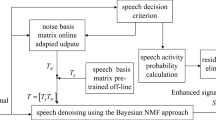Abstract
In this paper, we propose efficient the number of computational iteration method of MNMF for speech recognition. The proposed method initializes estimates MNMF algorithm with the estimated spatial correlation matrix reduces the number of iteration of updates algorithm. The experiment result shows that our method reduced the computational complexity of MNMF.
Access this chapter
Tax calculation will be finalised at checkout
Purchases are for personal use only
Similar content being viewed by others
References
Lee, D.D., et al.: Learning the parts of objects with nonnegative matrix factorization. Nature 401, 788–791 (1999)
Sawada, H., et al.: Multichannel extensions of non-negative matrix factorization with complex-valued data. IEEE Trans. ASLP 21(5), 971–982 (2013)
Miura, I., et al.: Analysis of initial-value dependency in multichannel nonnegative matrix factorization for blind source separation and speech recognition. J. IEICE J100–D, 376–384 (2017)
Uramoto, T., et al.: Sequential initial value setting associated with increasing number of channels in multi-channel nonnegative matrix factorization In: ASJ, pp. 535–538 (2017)
Nakatani, T., et al.: NTT CHiME-3 speech recognition system: noise-robust frontend. In: ASJ, pp. 57–60 (2016)
Sawada, H., et al.: Underdetermined convolutive blind source separation via frequency bin-wise clustering and permutation alignment. IEEE Trans. Audio Speech Lang. Process. 19, 516–527 (2011)
Ito, N., et al.: Relaxed disjointness based clustering for joint blind source separation and dereverberation. In: Proceedings of IWAENC, pp. 268–272 (2014)
Kitamura, D., et al.: Efficient multichannel nonnegative matrix factorization with rank-1 spatial model. In: ASJ, pp. 579–527 (2014)
Baker, J., et al.: An analysis of environment, microphone and data simulation mismatches in robust speech recognition. In: Proceedings of the 4th International Workshop on Speech Processing in Everyday Environments (CHiME 2016) (2016)
Miura, I., et al.: Spatial correlation matrix estimation method in initial value setting of multi-channel non-negative matrix factorization. In: ASJ, pp. 567–570 (2017)
Acknowledgements
This work was supported by JSPS KAKENHI grant numbers 16K00245 and 15H02728.
Author information
Authors and Affiliations
Corresponding author
Editor information
Editors and Affiliations
Rights and permissions
Copyright information
© 2019 Springer International Publishing AG, part of Springer Nature
About this paper
Cite this paper
Izumi, T. et al. (2019). Reducing Computational Complexity of Multichannel Nonnegative Matrix Factorization Using Initial Value Setting for Speech Recognition. In: Barolli, L., Javaid, N., Ikeda, M., Takizawa, M. (eds) Complex, Intelligent, and Software Intensive Systems. CISIS 2018. Advances in Intelligent Systems and Computing, vol 772. Springer, Cham. https://doi.org/10.1007/978-3-319-93659-8_82
Download citation
DOI: https://doi.org/10.1007/978-3-319-93659-8_82
Published:
Publisher Name: Springer, Cham
Print ISBN: 978-3-319-93658-1
Online ISBN: 978-3-319-93659-8
eBook Packages: Intelligent Technologies and RoboticsIntelligent Technologies and Robotics (R0)




